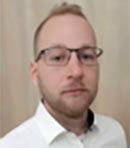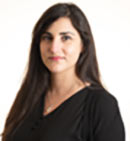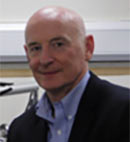Feb
22

Date: 22 February 2024
Time: 9:00 AM ET (New York Time)
Presenter(s): Dr. Abderrahim Halimi, Dr. Sandor Plosz,
Dr. Aurora Maccarone, Dr. Stephen McLaughlin,
Dr. Gerald S. Buller
Original article: Download Open Access article
Abstract
Deploying 3D single-photon Lidar imaging to real world applications presents multiple challenges especially when imaging in high noise environments such as underwater and/or imaging in the data sparse regime (e.g., when scanning few samples in compressed sensing or in the sparse photon regime due to low illumination). Several algorithms have been proposed to address these issues based on statistical or learning-based frameworks. Statistical methods provide rich information about the inferred parameters but are limited by the assumed model correlation structures, while deep learning methods show state-of-the-art performance but limited inference guarantees, preventing their extended use in critical applications.
This presentation first introduces a statistical framework for robust reconstruction of complex 3D LiDAR scenes while providing uncertainty measures about the depth and reflectivity parameters. The presenters will then propose generalizations of this model. To enable fast real-time processing at milliseconds frames-per-second, they approximate this model and implement its parallel operations using a GPU. This fast algorithm is validated on highly noisy data acquired in an underwater environment. They also unroll the statistical Bayesian algorithm into a new deep learning architecture which requires a reduced number of trainable parameters, and provides rich information about the estimates including uncertainty measures. The proposed algorithms will be compared to existing state-of-the-art methods on different problems including target detection and robust reconstruction of high-dimensional data (3D videos or multispectral data).
Biography
 Abderrahim Halimi (M’14-SM’20) received the Eng. degree in electronics from the National Polytechnic School of Algiers, Algeria, in 2009, and both the M.Sc. and Ph.D. degrees from the Institut National Polytechnique de Toulouse, France, in 2010 and 2013, respectively.
Abderrahim Halimi (M’14-SM’20) received the Eng. degree in electronics from the National Polytechnic School of Algiers, Algeria, in 2009, and both the M.Sc. and Ph.D. degrees from the Institut National Polytechnique de Toulouse, France, in 2010 and 2013, respectively.
He is currently an Assistant Professor and Royal Academy of Engineering (RAEng) Research Fellow at Heriot-Watt University, United-Kingdom and was a Post-Doctoral Research Associate from 2013 to 2018. His research activities focus on statistical and learning-based signal and image processing, with applications to single-photon depth imaging, remote sensing and medical imaging.
Dr. Halimi is the recipient of a 5-years RAEng Research Fellowship, an elected member of the EURASIP Technical Area Committees (TMTSP since 2019 and SPMuS since 2022) and an Elsevier Associate Editor for Digital Signal Processing (since 2022) and Signal Processing SigPro (since 2023).
 Sandor Plosz received the M.Sc. degree in computer science from the Budapest University of Technology and Economics, Budapest, Hungary, in 2009, and the Ph.D. degree in 2019.
Sandor Plosz received the M.Sc. degree in computer science from the Budapest University of Technology and Economics, Budapest, Hungary, in 2009, and the Ph.D. degree in 2019.
Dr. Plosz continued to work there as an engineer on several national and international R&D projects with close cooperation with industry. He has been a Research Associate with Heriot-Watt University, Edinburgh, U.K since 2020. His research interests include computer vision, machine learning, and algorithmic optimizations.
 Aurora Maccarone received the graduation degree in physics from Universitá di Palermo, Palermo, Italy, and the Ph.D. degree in physics from Heriot-Watt University, Edinburgh, U.K., in 2016. Following her doctoral studies, she was with Heriot-Watt University, where she took her first position as a PDRA.
Aurora Maccarone received the graduation degree in physics from Universitá di Palermo, Palermo, Italy, and the Ph.D. degree in physics from Heriot-Watt University, Edinburgh, U.K., in 2016. Following her doctoral studies, she was with Heriot-Watt University, where she took her first position as a PDRA.
Dr. Maccarone has been a Research Fellow funded by the Royal Academy of Engineering since 2020. Her research interests include single photon technologies, imaging in challenging conditions, and quantum communications.
 Stephen McLaughlin (Fellow, IEEE) received the B.Sc. degree from the University of Glasgow, Glasgow, U.K., in 1981, and the Ph.D. degree from The University of Edinburgh, Edinburgh, U.K., in 1990.
Stephen McLaughlin (Fellow, IEEE) received the B.Sc. degree from the University of Glasgow, Glasgow, U.K., in 1981, and the Ph.D. degree from The University of Edinburgh, Edinburgh, U.K., in 1990.
He joined Heriot-Watt University, Edinburgh, as a professor of signal processing in October 2011. From 1981 to 1986, he was a Development Engineer in industry. In 1986, he joined the Department of Electronics and Electrical Engineering, The University of Edinburgh, and ultimately held the Chair in electronic communication systems.
Dr. McLaughlin is a Fellow of the Royal Academy of Engineering, Royal Society of Edinburgh, and Institute of Engineering and Technology. He is a EURASIP Fellow.
 Gerald S. Buller received the B.Sc. (Hons.) degree in natural philosophy from the University of Glasgow, Glasgow, U.K., in 1986, and the Ph.D. degree in physics from Heriot-Watt University, Edinburgh, U.K., in 1989.
Gerald S. Buller received the B.Sc. (Hons.) degree in natural philosophy from the University of Glasgow, Glasgow, U.K., in 1986, and the Ph.D. degree in physics from Heriot-Watt University, Edinburgh, U.K., in 1989.
He is currently a professor of physics with Heriot-Watt University. In 2002, he co-founded Helia Photonics Ltd., Livingston, U.K. His research interests include single-photon detection methods, particularly at infrared wavelengths, and applications involving the use of single photons. These applications include single-photon depth imaging and novel quantum communications protocols.
Dr. Buller is a Fellow of the Royal Society of Edinburgh, U.K., Institute of Physics, and Optical Society of America. He was the recipient of an EPSRC Established Career Fellowship in quantum technology to research sparse photon imaging in 2015.
